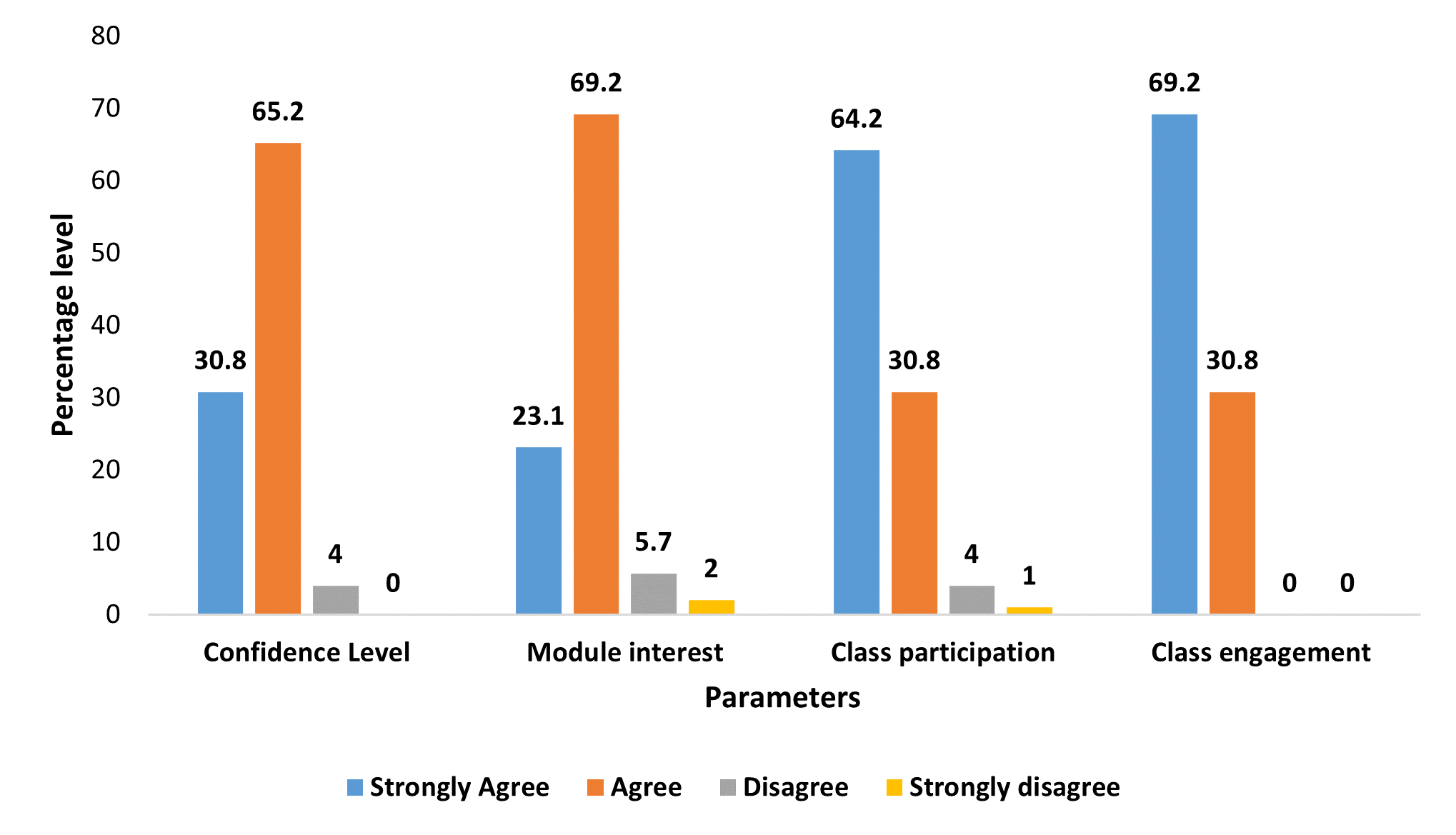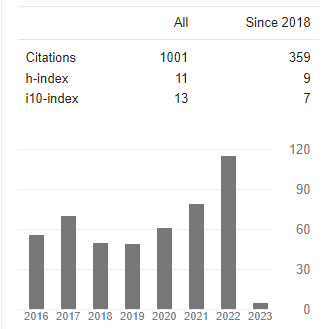Collaborative Digital Tool-Mediated Peer Feedback Boosts Class Engagement and Interest Among Non-Traditional Higher Education Students: An Action Research Study.
Abstract
Peer feedback is an essential component of the learning process in higher education and can significantly boost students' academic and personal development, resulting in more effective and engaged learning experiences. There are several strategies for implementing peer feedback, and it is crucial to choose an approach that is appropriate for the learners, considering the specifics of the module and the characteristics of the students. The action research aimed to investigate the impact of Collaborative Digital Tools on Peer Feedback in Enhancing Engagement and Interest in Numerical Activities Among Nontraditional HE Students. The study used a mixed approach to construct participant views on their learning experience following the intervention. Data collected were analysed to assess the effectiveness of Padlet as a feedback-providing tool. The results indicate that using Collaborative Digital Tools such as Padlet for peer feedback enhances students' confidence, Interest, and engagement and fosters a collaborative learning culture where students gain new ideas and work together to achieve common goals. Based on the action research findings, it is recommended that technological tools be incorporated into teaching and learning, particularly for adult learners.
Downloads
References
Arnold, J., Mundy, B. (2020). praxis pedagogy in teacher education. Smart Learn. Environ. 7, 8. https://doi.org/10.1186/s40561-020-0116-z
Butcher, C. (2015). Describing what students should learn. In: Fry et al (2015) A Handbook for Teaching and Learning in Higher Education. Oxon: Routledge
Campbell S, Greenwood M, Prior S, Shearer T, Walkem K, Young S, Bywaters D, Walker K. (2020). Purposive sampling: complex or simple? Research case examples. J Res Nurs. 25(8):652-661. doi: 10.1177/1744987120927206.
Chung, Ethel; Turnbull, Deborah; Chur-Hansen, Anna (2017). Differences in resilience between 'traditional' and 'non-traditional' university students. Active Learning in Higher Education. 18: 77–87.
Cotton, D. R., Nash, T., & Kneale, P. (2017). Supporting the retention of non-traditional students in Higher Education using a resilience framework. European Educational Research Journal, 16(1), 62-79. https://doi.org/10.1177/1474904116652629
Damon, W. ,& Phelps, E. (1989). Critical distinctions among three approaches to peer education. International Journal of Educational Research, 13, 9-19.
Falchikov, N. (1995) Peer Feedback Marking: Developing Peer Assessment, Innovations in Education and Training International, 32:2, 175-187, DOI: 10.1080/1355800950320212
Garcia, T. (1995). The role of motivational strategies in self-regulated learning. New directions for teaching and learning, 1995(63), 29-42.
Gaynor, J. W. (2020). Peer review in the classroom: Student perceptions, peer feedback quality and the role of assessment. Assessment & Evaluation in Higher Education, 45(5), 758–775.
Gedye, S. (2010) Formative assessment and feedback: a review, Planet, 23:1, 40-45, DOI: 10.11120/plan.2010.00230040.
Gibbs, G. (2010) Dimensions of Quality. The Higher Education Academy. www.heacademy.ac.uk
Harden, R. M., & Stamper, N. (1999). What Is a Spiral Curriculum? Medical Teacher, 21(2), 141–143.
Hattie, J., & Timperley, H. (2007). The Power of Feedback. Review of Educational Research, 77(1), 81-112. https://doi.org/10.3102/003465430298487
Ivanic, R., Clark, R. & Rimmershaw, R. (2000) what am I supposed to make of this? The messages conveyed to students by tutors comments, in: M. Lea and B. Stierer (Eds) Student writing in higher education: new contexts (Buckingham, SRHE).
Kim, K.A. (2002). ERIC review: Exploring the meaning of "nontraditional at the community college. Community College Review. 30 (1): 74–
Kluger, A. N., & DeNisi, A. (1996). The effects of feedback interventions on performance: A historical review, a meta-analysis, and a preliminary feedback intervention theory. Psychological Bulletin, 119(2), 254.
Mandeep Singh Nathial, A Study of Adjustment and Emotional Intelligence of University
Coaches in India, American Journal of Applied Psychology. Volume 3, Issue 6, November 2014
, pp. 122-126. doi: 10.11648/j.ajap.20140306.11
Nathial, Mandeep Singh. A COMPARATIVE AND ANALYTICAL STUDY OF SELF-ESTEEM AND JOB SATISFACTION IN ATHLETES AND NON ATHLETES. Journal of Advances in Social Science and Humanities, 2(10).https://doi.org/10.15520/jassh210123
Mandeep Singh., Assessment of Vocational Interests of Pahadi&Bakarwal School Students In Relation To Their Gender. Int J Recent Sci Res. 9(3), pp. 24817-24819. DOI: http://dx.doi.org/10.24327/ijrsr.2018.0903.1731
Mandeep Singh, 2019; “Effect of Mobile Screen Psychomotor Digital Image Motivators in Person Technique in Reducing Anxiety Level of Intervarsity Players of Cluster University Jammu, Blue Eyes Intelligence Engineering and Sciences Publication (BEIESP). Volume-9 Issue-1, October 2019, PP: 3750-3752, DOI: 10.35940/ijeat.A9811.109119. https://www.ijeat.org/portfolio-item/A9811109119/
Mandeep Singh. (2018). THE AWARENESS OF MOVEMENT AND FITNESS SCIENCES AMONG SCHOOL, UNDER GRADUATE AND POST GRADUATE LEVEL STUDENTS: EMPOWERING EDUCATION THROUGH PHYSICAL EDUCATION. European Journal of Physical Education and Sport Science, 4(3).https://doi.org/10.5281/zenodo.1218149
Marulcu, I & Barnett, M. (2016) Impact of an engineering design-based curriculum compared to an inquiry-based curriculum on fifth graders’ content learning of simple machines, Research in Science & Technological Education, 34:1, 85-104, DOI: 10.1080/02635143.2015.1077327
McConlogue, T. (2015). Making Judgements: Investigating the Process of Composing and Receiving Peer Feedback.Studies in Higher Education 40 (9): 1495–1506.
Molina Roldán S, Marauri J, Aubert A, Flecha R. (2021). How Inclusive Interactive Learning Environments Benefit Students Without Special Needs. Front Psychol..
Munna, Afzal and Kalam, M. A. (2021) Application of Theories, Principles and Models of Curriculum Design: A Literature Review. International Journal of Multidisciplinary and Current Educational Research, 3 (1). ISSN 2581-7027
Naeem, M., Ozuem, W., Howell, K., & Ranfagni, S. (2023). A Step-by-Step Process of Thematic Analysis to Develop a Conceptual Model in Qualitative Research. International Journal of Qualitative Methods, 22.
Nicol, D. (2020) The power of internal feedback: exploiting natural comparison processes. Assessment and Evaluation in Higher Education. Vol. 46, No. 5, pp. 756-778
Nicol, D., & Macfarlane-Dick, D. (2006). Formative Assessment and Self-Regulated Learning: A Model and Seven Principles of Good Feedback Practice. Studies in Higher Education, 31, 199-218.
Panacci, Adam G. (2017). Adult Students in Mixed-Age Postsecondary Classrooms: Implications for Instructional Approaches". College Quarterly. 20 (2). Retrieved 8 July 2017. 89.
Petsuwan, S., Pimdee, P., & Pupat, P. (2019). Strategies for Using the Satellite Distance Education System in Thailand that Affect Student Quality of Marginal Schools in the Lower North Region.
Pintrich, P. R., & Zusho, A. (2002). The development of academic self-regulation: The role of cognitive and motivational factors. In A. Wigfield & J. S. Eccles (Eds.), Development of achievement motivation (pp. 249–284). Academic Press.
Porter A.L., Portillo E.C., Gallimore C.E., Zorek J.A., Barnett S.G. (2020). Let External Stakeholders Be Your Guide to Curricular Revision. Am J Pharm Educ. 2020 Aug;84(8):ajpe8021. doi: 10.5688/ajpe8021. PMID: 32934390; PMCID: PMC7473222.
Ritchie, J., Lewis, J., Nicholls, C.M., & Ormston, R. (2013). Qualitative research practice a guide for social science students and researchers.
Rompay-Bartels, I.V., & Geessink, J. (2021). Exploring peer feedback on behaviour in the international classroom: a case study on students’ experiences and perceptions. Journal of International Education in Business.
Rusticus S.A., Pashootan T., Mah A. (2023). What are the key elements of a positive learning environment? Perspectives from students and faculty. Learn Environ Res.
Sadler, D. R. (1989). Formative Assessment and the Design of Instructional Systems. Instructional Science, 18, 119-144.
http://dx.doi.org/10.1007/BF00117714
Shochet R.B., Colbert-Getz J.M., Levine R.B., Wright S.M. (2023). Gauging events that influence students’ perceptions of the medical school learning environment: Findings from one institution. Academic Medicine. 88:246–252.
Sivaci, S. (2020). The Effects of Peer Feedback on Writing Anxiety Levels of Pre-Service English Teachers. The Reading Matrix: An International Online Journal, 20(2), 131-139.
Snape, D., & Spencer, L. (2003). Chapter 1. The foundations of Qualitative Research. In J. Richie, & J. Lewis (Eds.), Qualitative Research Practice: A Guide for Social Science Students and Researchers (pp. 1-23). Sage.
Strijbos, J.-W., Narciss, S., & Dünnebier, K. (2010). Peer feedback content and sender's competence level in academic writing revision tasks: Are they critical for feedback perceptions and efficiency? Learning and Instruction, 20(4), 291–303. https://doi.org/10.1016/j.learninstruc.2009.08.008
Stringer, E. T. (2014). Action Research: A Handbook for Practitioners (4th ed.). Thousand Oaks, CA: SAGE.
Tsui, A.B.M. and Ng, M. (2000) Does Secondary L2 Writers Benefit from Peer Comments? Journal of Second Language Writing, 9, 147-170. http://dx.doi.org/10.1016/S1060-3743(00)00022-9
Tyler, R.W. (1949) Basic Principles of Curriculum and Instruction. University of Chicago Press, Chicago
van Popta, E., Kral, M., Camp, G., Martens, R. L., & Simons, P. R.-J. (2017). Exploring the value of peer feedback in online learning for the provider. Educational Research Review, 20, 24-34. https://doi.org/10.1016/j.edurev.2016.10.003
Watts, M., Bridges, D. (2006). Enhancing Students' Capabilities?: UK Higher Education and the Widening Participation Agenda. In: Deneulin, S., Nebel, M., Sagovsky, N. (eds) Transforming Unjust Structures The Capability Approach. Library of Ethics and Applied Philosophy, vol 19. Springer, Dordrecht. https://doi.org/10.1007/1-4020-4432-1_8
Wiliam, D. (2011). What Is Assessment for Learning? Studies in Educational Evaluation, 37, 3-14
Yan, Z., Li, Z., Panadero, E., Yang, M., Yang, L., & Lao, H. (2021). A systematic review on factors influencing teachers’ intentions and implementations regarding formative assessment. Assessment in Education: Principles, Policy & Practice, 28(3), 228–260. h
Zhu, C. (2012). Providing formative feedback to students via emails and feedback strategies based on student metacognition. Reflecting education, 8, 78-93.

Copyright (c) 2024 Odoligie Imarhiagbe

This work is licensed under a Creative Commons Attribution 4.0 International License.














